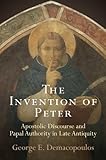The Invention of Peter : Apostolic Discourse and Papal Authority in Late Antiquity / George E. Demacopoulos.
Material type: TextSeries: Divinations: Rereading Late Ancient ReligionPublisher: Philadelphia : University of Pennsylvania Press, [2013]Copyright date: ©2013Description: 1 online resource (272 p.)Content type:
TextSeries: Divinations: Rereading Late Ancient ReligionPublisher: Philadelphia : University of Pennsylvania Press, [2013]Copyright date: ©2013Description: 1 online resource (272 p.)Content type: - 9780812245172
- 9780812208641
- Petrine office -- History of doctrines -- Early church, ca. 30-600
- Popes -- Primacy -- History of doctrines -- Early church, ca. 30-600
- History-Ancient/Classical up to 500 CE
- History-Medieval 500 to 1500
- Religion/Religious Studies
- RELIGION / Christianity / History
- Ancient Studies
- History
- Medieval and Renaissance Studies
- Religion
- Religious Studies
- 262/.1309015 23
- online - DeGruyter
| Item type | Current library | Call number | URL | Status | Notes | Barcode | |
|---|---|---|---|---|---|---|---|
 eBook
eBook
|
Biblioteca "Angelicum" Pont. Univ. S.Tommaso d'Aquino Nuvola online | online - DeGruyter (Browse shelf(Opens below)) | Online access | Not for loan (Accesso limitato) | Accesso per gli utenti autorizzati / Access for authorized users | (dgr)9780812208641 |
Frontmatter -- Contents -- Introduction -- Chapter 1. Petrine Legends, External Recognition, and the Cult of Peter in Rome -- Chapter 2. The Many Faces of Leo’s Peter -- Chapter 3. Gelasius’ Domestic Problems and International Posture -- Chapter 4. The Petrine Discourse in Theoderic’s Italy and Justinian’s Empire -- Chapter 5. Restraint and Desperation in Gregory the Great’s Petrine Appeal -- Postscript: The Life of St. Gregory of Agrigentum as a Seventh-Century Petrine Critique of the Papacy -- Conclusion: The Invention of Peter -- Appendix I. Pope Gelasius to Augustus Anastasius -- Appendix II. Tract VI -- Notes -- Bibliography -- Index -- Acknowledgments
restricted access online access with authorization star
http://purl.org/coar/access_right/c_16ec
On the first anniversary of his election to the papacy, Leo the Great stood before the assembly of bishops convening in Rome and forcefully asserted his privileged position as the heir of Peter the Apostle. This declaration marked the beginning of a powerful tradition: the Bishop of Rome would henceforth leverage the cult of St. Peter, and the popular association of St. Peter with the city itself, to his advantage. In The Invention of Peter, George E. Demacopoulos examines this Petrine discourse, revealing how the link between the historic Peter and the Roman Church strengthened, shifted, and evolved during the papacies of two of the most creative and dynamic popes of late antiquity, ultimately shaping medieval Christianity as we now know it.By emphasizing the ways in which this rhetoric of apostolic privilege was employed, extended, transformed, or resisted between the reigns of Leo the Great and Gregory the Great, Demacopoulos offers an alternate account of papal history that challenges the dominant narrative of an inevitable and unbroken rise in papal power from late antiquity through the Middle Ages. He unpacks escalating claims to ecclesiastical authority, demonstrating how this rhetoric, which almost always invokes a link to St. Peter, does not necessarily represent actual power or prestige but instead reflects moments of papal anxiety and weakness. Through its nuanced examination of an array of episcopal activity—diplomatic, pastoral, political, and administrative—The Invention of Peter offers a new perspective on the emergence of papal authority and illuminates the influence that Petrine discourse exerted on the survival and exceptional status of the Bishop of Rome.
Mode of access: Internet via World Wide Web.
In English.
Description based on online resource; title from PDF title page (publisher's Web site, viewed 08. Aug 2023)


